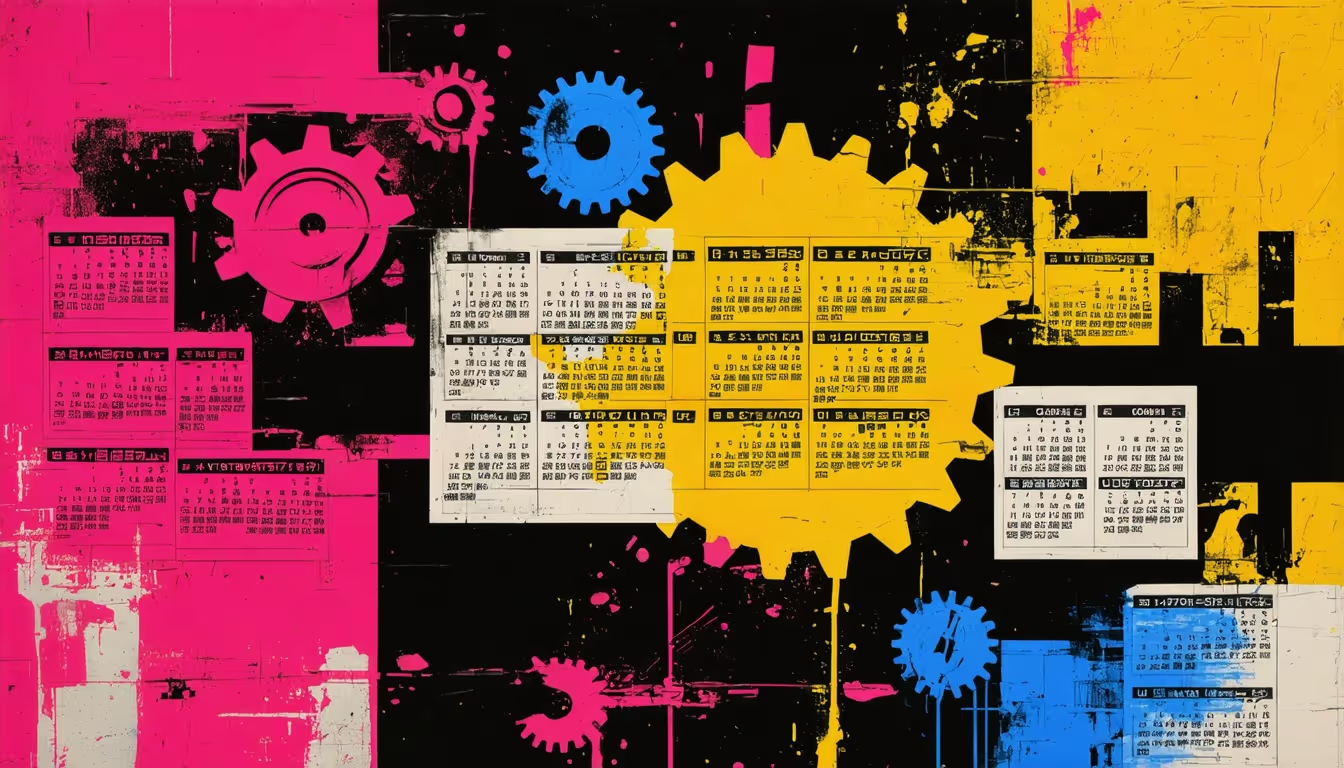Transportation companies face the overwhelming challenge of conducting comprehensive vehicle inspections while managing extensive documentation requirements and defect tracking systems. Fleet safety, operational efficiency, and regulatory standing depend on proper inspection processes across diverse vehicle types and operational environments.
What should be a systematic safety management process often becomes an overwhelming cycle of manual inspection documentation, defect coordination, and compliance reporting. This can consume countless hours while fleet managers struggle to maintain current records and ensure timely resolution of critical safety issues across large vehicle fleets.
A single missed defect or incomplete inspection documentation can result in regulatory violations, vehicle breakdowns, and significant safety incidents. These threaten both operational continuity and regulatory compliance in competitive transportation markets.
Thanks to advancements in Agentic AI, it's now becoming easier than ever to automate these complex inspection workflows. This transformation helps transportation companies manage comprehensive vehicle safety documentation and defect tracking systems.
This article will explore how AI agents can revolutionize vehicle inspection documentation and defect tracking, helping transportation professionals ensure rigorous safety compliance while reducing administrative burden and improving fleet reliability.
Definition of Vehicle Inspection Documentation and Defect Tracking
Vehicle inspection documentation and defect tracking involves systematically recording vehicle safety inspections and identifying mechanical defects. The process includes coordinating repair activities and maintaining comprehensive records that demonstrate compliance with transportation safety regulations.
This critical safety function encompasses inspection scheduling, defect identification, repair coordination, and compliance documentation that supports proper vehicle maintenance.
The process has evolved significantly from basic maintenance logs to sophisticated digital inspection systems. Modern systems address complex regulatory requirements, predictive maintenance protocols, and integrated fleet management frameworks.
Current vehicle inspection management requires understanding intricate safety regulations and coordinating with maintenance teams. All inspection activities must support comprehensive vehicle safety while maintaining detailed documentation for regulatory compliance and fleet optimization.
Why Vehicle Inspection Documentation and Defect Tracking is Important for Transportation Companies
Effective vehicle inspection documentation and defect tracking serves as the foundation of transportation safety management. It directly impacts fleet reliability, regulatory compliance, and the company's ability to maintain operational efficiency while ensuring driver and public safety.
Transportation companies function as complex safety coordinators who ensure all vehicles meet safety standards. They maintain comprehensive documentation needed for regulatory compliance, insurance requirements, and operational planning throughout the vehicle lifecycle.
The importance extends far beyond basic compliance requirements. Strategic vehicle inspection management enables transportation companies to optimize fleet performance and implement predictive maintenance strategies.
It helps maintain positive relationships with regulatory authorities that support long-term operational success and cost efficiency. Effective inspection documentation also supports risk management by identifying potential safety issues before they become critical problems.
This enables proactive maintenance planning that protects operational continuity and safety performance while reducing overall fleet operating costs.
For transportation companies, vehicle inspection management represents a crucial area where operational excellence directly impacts safety outcomes and regulatory standing.
Organizations that consistently deliver comprehensive, well-documented inspection programs often experience improved fleet reliability and stronger regulatory relationships. They contribute to enhanced safety performance and reduced maintenance costs across their transportation operations.
Common Time Sinks in Vehicle Inspection Documentation and Defect Tracking
Transportation companies continue to struggle with manual processes that consume enormous amounts of time. These create significant risk of documentation gaps and defect tracking failures that can impact fleet safety and regulatory compliance.
The inefficiencies increase administrative costs and limit time available for proactive maintenance activities and fleet optimization that could improve safety outcomes and operational efficiency.
Manual Inspection Documentation and Record Compilation
Fleet managers spend countless hours manually documenting vehicle inspections and recording defect findings. They compile detailed inspection reports while ensuring all safety issues are properly captured and documented according to regulatory requirements.
Each inspection requires extensive documentation of vehicle conditions, defect identification, and safety assessments. Managers must maintain comprehensive records that support safety compliance audits and regulatory inspections across diverse vehicle types and operational requirements.
Complex Multi-Vehicle Defect Coordination and Repair Tracking
Managing defects across large vehicle fleets requires extensive coordination of repair activities, parts procurement, and maintenance scheduling. Fleet coordinators must ensure all safety issues receive appropriate attention and timely resolution.
They manually track defect status and coordinate with maintenance teams while maintaining detailed records of repair progress. This requires comprehensive performance tracking systems that ensure vehicle safety and operational readiness.
Comprehensive Regulatory Compliance Documentation and Reporting
Creating complete inspection documentation packages requires detailed compilation of inspection records, defect tracking, and compliance verification. All materials must meet regulatory specifications and support safety audit requirements.
Fleet managers manually organize inspection documentation and verify completeness of required records. They coordinate with regulatory affairs teams to ensure proper documentation that demonstrates ongoing safety compliance.
Fleet Performance Analysis and Maintenance Planning
Analyzing inspection outcomes and defect patterns requires extensive review of historical data and identification of maintenance trends.
Fleet managers coordinate with operations teams to implement systematic improvements while ensuring fleet performance metrics accurately reflect vehicle conditions. This involves detailed trend analysis and strategic planning processes that assess maintenance effectiveness.
Datagrid for Transportation Companies
Transform your vehicle inspection operations with AI agents specifically designed to handle multi-vehicle safety coordination complexity. The platform maintains accuracy and compliance standards required for transportation safety excellence.
Datagrid seamlessly integrates with fleet management systems, maintenance databases, and regulatory tools to automate inspection workflows. It ensures comprehensive documentation and efficient defect tracking across diverse vehicle fleets and operational requirements.
Automated Inspection Documentation and Digital Record Management
AI agents revolutionize vehicle inspection through intelligent document processing that automatically captures inspection data. They identify safety defects and generate comprehensive inspection records while ensuring all documentation meets regulatory requirements.
The agents understand complex vehicle systems and recognize critical safety issues. They automatically generate detailed inspection reports that support effective fleet management and regulatory compliance.
Sophisticated Multi-Vehicle Defect Coordination and Repair Management
Deploy AI agents that excel at automated workflow design to coordinate defect repairs across vehicle fleets. They track maintenance activities and ensure all safety issues receive appropriate attention and timely resolution.
The agents automatically assign repair priorities and monitor completion status while coordinating with maintenance teams. They maintain comprehensive records of all vehicle defects and their resolution status.
Comprehensive Safety Compliance Monitoring and Regulatory Reporting
AI agents provide advanced compliance monitoring capabilities that automatically organize inspection documentation. They verify completeness of required records and ensure all fleet safety programs meet regulatory specifications and audit requirements.
The system automatically generates compliance reports and tracks regulatory requirements while coordinating with safety teams to ensure comprehensive fleet safety documentation.
Intelligent Fleet Performance Analytics and Predictive Maintenance
Transform fleet management with AI agents that provide sophisticated performance tracking capabilities. They automatically analyze inspection outcomes and track defect patterns while identifying maintenance trends. The agents provide strategic insights that support proactive fleet management and cost optimization across transportation operations.
Real-time Defect Monitoring and Priority Management
AI agents provide continuous monitoring of vehicle defects and automatically identify critical safety issues and potential delays.
They coordinate escalation procedures to ensure high-priority safety concerns receive immediate attention and resolution through comprehensive safety alert systems and maintenance coordination.
Advanced Fleet Safety Analytics and Risk Assessment
AI agents deliver sophisticated risk assessment capabilities that automatically analyze inspection data. They identify emerging safety patterns and suggest proactive maintenance strategies while supporting strategic fleet planning. Resource allocation decisions enhance overall vehicle safety and operational reliability.
Automated Driver Communication and Safety Coordination
AI agents streamline driver coordination through automated communication workflows that notify drivers of vehicle status. They coordinate pre-trip inspections and ensure all safety requirements are communicated effectively. The system maintains comprehensive records of driver safety interactions and vehicle readiness status.
Comprehensive Maintenance Scheduling and Resource Optimization
AI agents provide detailed maintenance coordination capabilities that automatically schedule vehicle inspections. They coordinate repair activities and optimize maintenance resources while ensuring all fleet vehicles maintain optimal safety and operational status. This happens through efficient workflow automation and resource allocation.
Dynamic Fleet Safety Monitoring and Incident Prevention
AI agents continuously monitor fleet safety metrics to automatically identify potential safety risks. They coordinate preventive maintenance and ensure all transportation operations maintain adherence to safety standards. This includes regulatory requirements across diverse operational environments and vehicle types.
Advanced Analytics and Strategic Fleet Intelligence
Transform fleet strategy with AI agents that provide comprehensive trend analysis of inspection performance. They analyze defect patterns and maintenance effectiveness while generating strategic recommendations. These support fleet optimization and safety program enhancement that improve operational outcomes across transportation operations.
Integrated Fleet Management System Coordination
AI agents ensure seamless coordination with fleet management systems through automated data integration. They maintain consistency between inspection records and operational data while providing comprehensive visibility. This includes vehicle safety status and maintenance requirements across entire transportation fleets.
Quality Control and Audit Trail Management
AI agents maintain comprehensive quality checking processes that automatically verify inspection documentation. They ensure completeness of required safety records and maintain detailed audit trails. These support regulatory compliance and safety standards throughout all vehicle inspection and defect tracking activities.
Simplify Tasks with Datagrid's Agentic AI
Don't let complexity slow down your team. Datagrid's AI-powered platform is designed specifically for teams who want to:
- Automate tedious data tasks
- Reduce manual processing time
- Gain actionable insights instantly
- Improve team productivity
See how Datagrid can help you increase process efficiency with AI agents for data organization and automated report generation.













